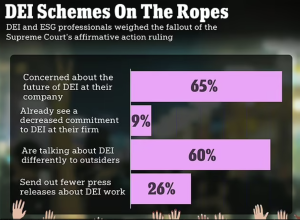Here’s something that the HR profession is perhaps guilty of not saying often enough: that the role of the recruiter involves much (much) more than simply hiring.
Because recruitment isn’t just about meeting diversity and equity targets. It’s about creating an environment where everyone feels included and contributes to sustainable competitive value.
Recruiter are a businesses’ strategic partner – tasked with building a more resilient workforce; and one that is diverse, inclusive and reflects the values of the organization.
However, many business leaders fail to recognize the impact recruiters can have on commercial success and their bottom line.
In an era of efficiency, when talent acquisition teams are racing against the clock to source and hire candidates, business leaders jeopardize retention and long-term growth by prioritizing efficiency over diversity, equity, inclusion and belonging (DEIB) and the candidate experience.
It’s my view therefore, that to remain competitive, and to align with the changing DEIB landscape, business leaders must recognize and reframe the integral role recruiters play.
The question is though – is recognition happening fast enough in your organization?
How the recruiter role has evolved
As most people will recognize, DEIB programs and efforts took center stage in 2020, with the #MeToo movement and, of course, the big societal shift in the aftermath of the killing of George Floyd.
However, recent economic uncertainty and budget constraints now have many business leaders pushing for increased efficiency instead, relegating investments in DEIB programs and initiatives to the back burner:

Source: DailyMail
This is despite the fact DEIB efforts are known to be table stakes for many employees. In fact, 47% of tech professionals said a company’s reputation for DEIB can influence their decision to work there.
So where are we now?
It’s quite clear recruiters are now under immense pressure to meet metrics like time to hire and number of candidates in the pipeline.
But while these metrics are important, they overshadow the long-term implications of the hiring process.
The danger lies in being so focused on efficiency that companies may face unintended consequences in the future, including negative impacts on diversity, recruiting and retention efforts.
For example, if a recruiter rushes to fill a role, it may impact their ability to create a personalized interview experience. More often than not, this narrows the candidate pool or results in a hire who may not be well-suited for the role or organization.
Tech talent in particular is highly sought after, and so to recruit and retain top players, organizations need to stand out during the hiring process with a more personalized and inclusive approach.
The need to redefine the recruiter role
I believe recruiting’s role needs to be redefined.
Recruiters aren’t just matchmakers between companies and candidates; they play a crucial role in relationship management. Beyond filling roles, they need to ensure a positive experience for candidates that extends throughout their journey at the organization, contributing to increased employee engagement and reduced turnover.
Clearly, recruiters not only have a significant DEIB impact but also far-reaching implications for revenue. If people are the drivers of an organization’s success, then the role of the recruiter becomes central to winning and losing in the competitive landscape.
Recruiters one of the most critical levers for competitive differentiation and long-term growth, a role they are not often associated with internally.
To understand the relationship between DEIB and commercial success, I believe HR and leaders more broadly need to reassess the significance of recruiters and the entire recruitment process.
Here are three ways you can redefine the role of the recruiter at your organization and make an impact on DEIB:
Set clear DEIB goals
It’s important to establish clear goals around DEIB. Creating clear and measurable goals allows you to objectively measure how your recruiters are helping build a more diverse and equitable workplace.
Remaining transparent about the organization’s progress toward those goals is also essential. Transparency holds your organization accountable and fosters trust and engagement among employees and candidates, reinforcing the commitment to a workplace where all individuals can see themselves as valued contributors.
But remember: Although goals are important drivers of success, a truly inclusive organization starts and ends with an aligned culture and an unwavering leadership commitment to DEIB.
Identify the right sourcing tools
Recruiters need the right tools to streamline their processes, identify and engage top talent, and foster an inclusive and diverse workforce that drives organizational success. But not all recruiting tools are created equal.
For example, applicant tracking systems (ATS) are not always configured in a way that enables recruiters to easily create and manage relationships with candidates.
Equipping your recruiters with the right tools and technology can help you source talent without bias and present a consistent and positive candidate experience through every touch point.
Reframe talent acquisition as talent experience
Consider renaming your “talent acquisition” team to “talent experience.”
This shift emphasizes the importance of the candidate experience as the front end of the recruitment process.
Recruiters should act as an extension of your company’s authentic culture, and by reframing the role, you can empower them to create a more inclusive and engaging journey for candidates.
Similar to the way marketers map the customer journey, your recruiters need to understand the “candidate to well-tenured employee” pipeline.
This involves identifying gaps in the journey and instrumenting metrics that go beyond traditional ones, like time to fill.
To create a connected experience that resonates, recruiters need to orient to the employee journey, including where a candidate started in the process.
The role of the recruiter is to create an end-to-end journey that’s thoughtful and seamless, even for candidates who aren’t ultimately selected for the job.
It’s time to recognize the value of recruiters
The role of the recruiter has evolved far beyond its traditional function.
Recruiters now play a pivotal role in shaping an organization’s DEIB initiatives and helping the business maintain a competitive edge.
Diversity, equity, inclusion and belonging are increasingly important concerns, and it’s time to reframe the recruiter role to better align with the organization’s commitment to these values.
Paying attention to the talent experience, setting clear DEIB goals and providing the right tools are key to attracting top talent and future-proofing your organization.
